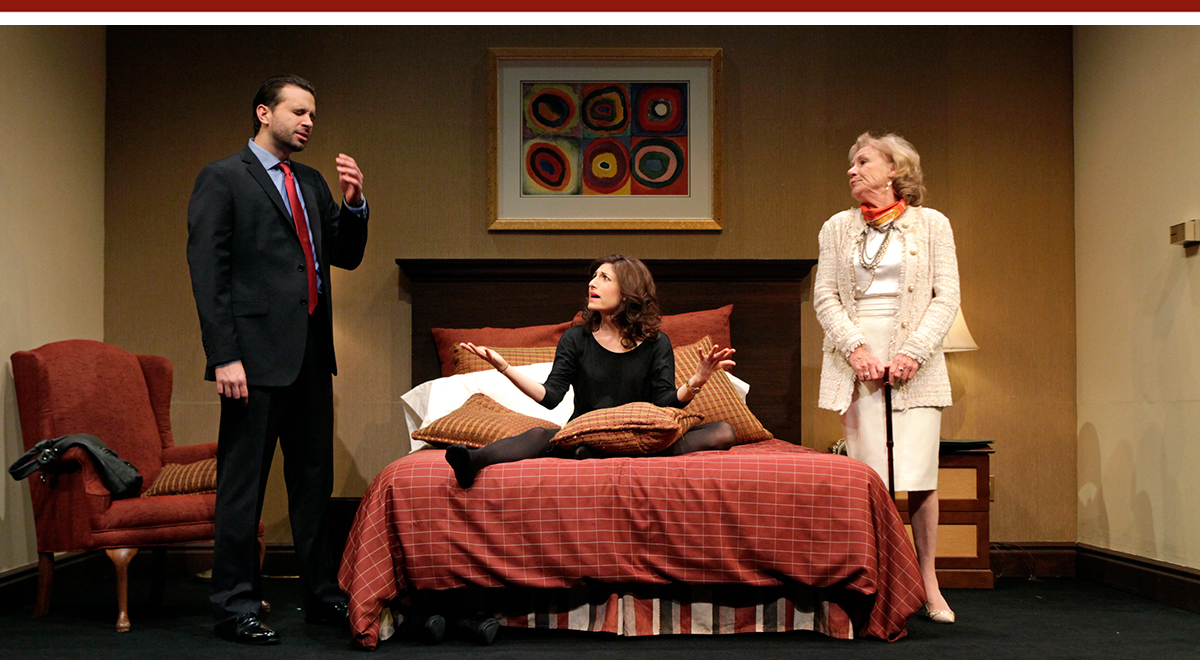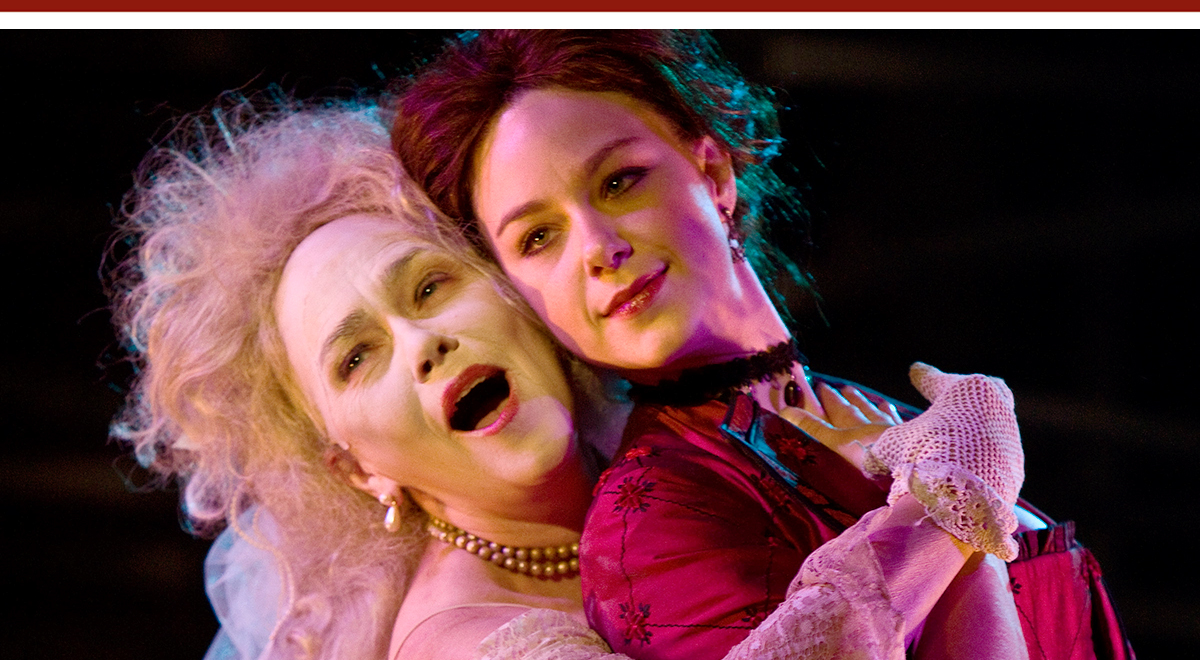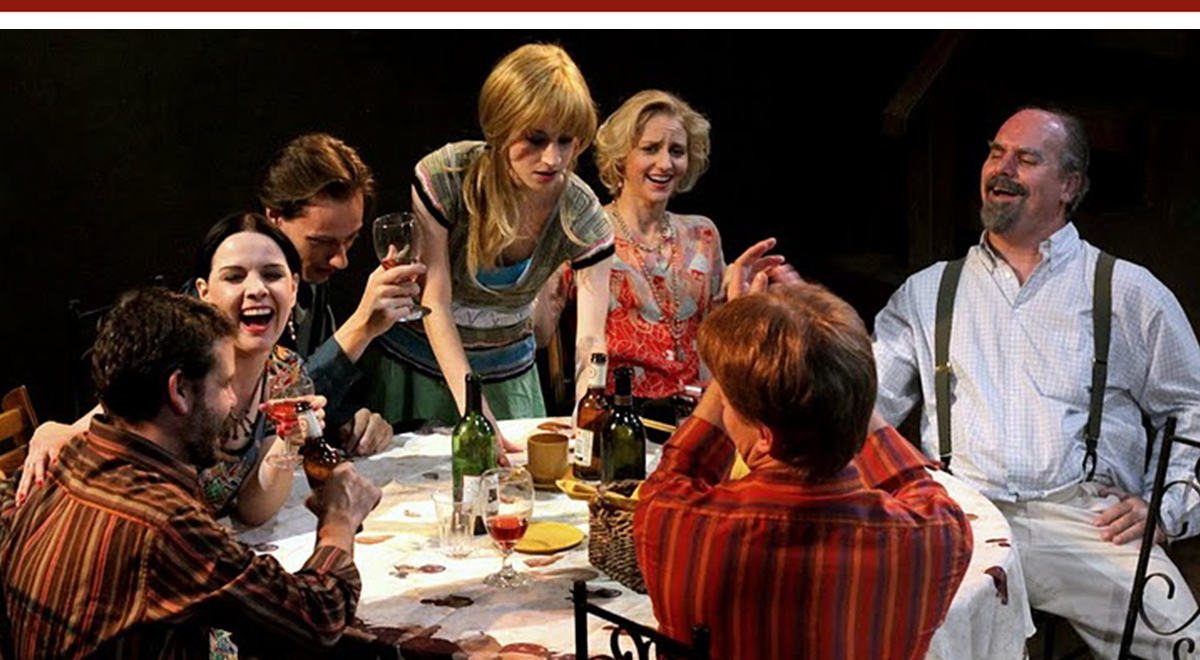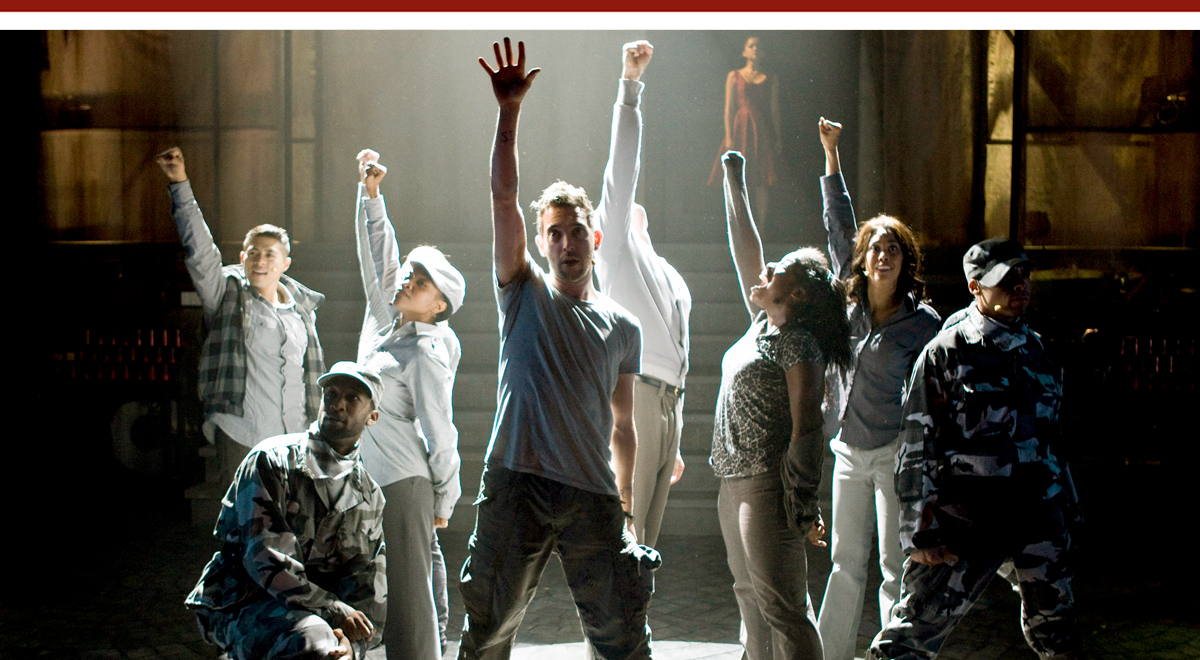NOVEMBER 2010
Click title to jump to review
THE AUTUMN GARDEN by Lillian Hellman | Antaeus Theatre Company
BECKY SHAW by Gina Gionfriddo | South Coast Repertory
GREAT EXPECTATIONS by Charles Dickens, adapted by | A Noise Within
ROCK 'N' ROLL by Tom Stoppard | Open Fist Theatre
VENICE by Eric Rosen and Matt Sax | Kirk Douglas Theatre
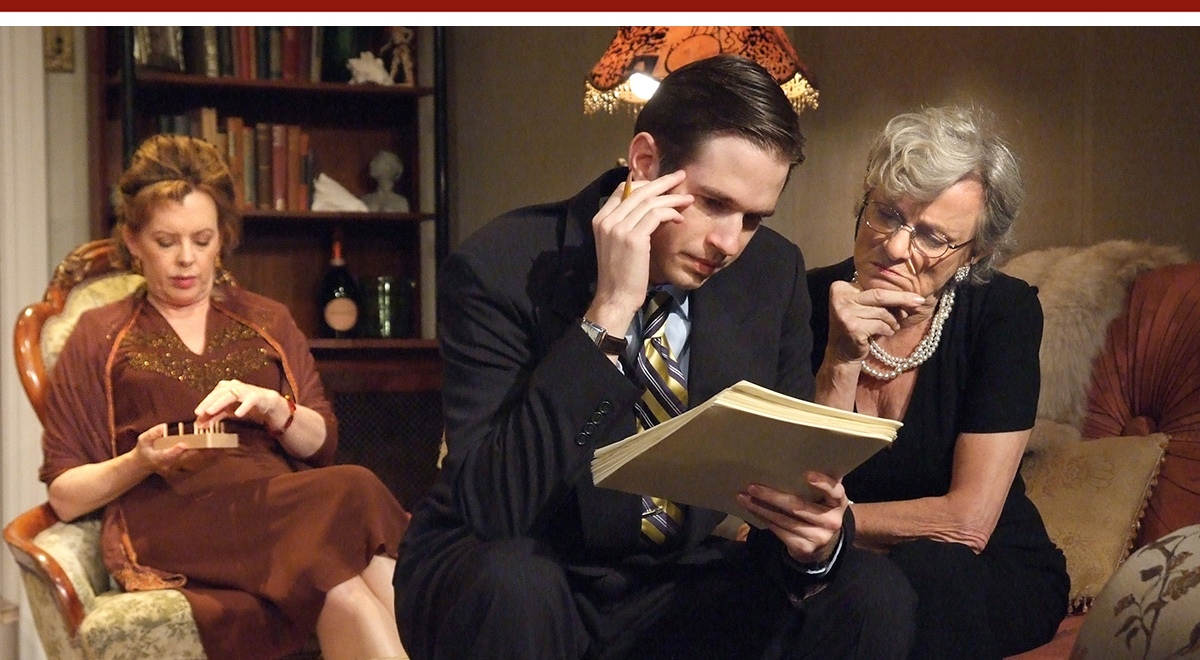
Accommodations
In 1951, the year Lillian Hellman’s Autumn Garden premiered on Broadway, a social scientist published his first book on the psychology of organizations. While Elliott Jaques saw workplace "social systems as defense against unconscious anxiety," the dramatist showed how the fundamental social system of marriage produces it.

Sixty years later, the seldom-produced play Hellman called her favorite (over more popular titles like The Children's Hour, The Little Foxes, Another Part of the Forest and Toys in the Attic) surfaces to close The Antaeus Company’s 2010 season (through December 17).
Guest Director Larry Biederman’s rotating casts ("Idealists," reviewed here, and "Dreamers") sprawl across Tom Buderwitz’ porch-and-sunroom set, creating the proper tone of languor and disillusion. It’s a mildly Chekhovian, Mid-Century study of mid-life crisis, well before that concept was coined, by Jaques, in 1965. Walter Kerr noted that "with The Autumn Garden, the transition is finally made [from Hellman’s emulation of Ibsen to characterization that] is ruefully Chekhovian, the mood of the play is the principal guide to its meaning."
Although the playwright insisted the title was an afterthought with no more meaning than her first choice, "Play No. 8," the double-edged metaphor of endeavoring to reseed, or simply recede as winter approaches, is apt. In September 1949, in a small, gossip-bound town on the Gulf, 100 miles east of New Orleans, most of the dozen characters will have the self-deluding dreams that have sustained them exposed, and be forced to accept their lot, or make the necessary changes to – to use another anticipated concept of Hellman's, live authentically. Only Mrs. Ellis, widowed and glad of it, is reconciled to her fate, as she sprinkles her hard-won wisdom to nurture the others' better ambitions and extinguish the ludicrous.
The once-grand Tuckerman home is an extended-stay residence for a group of "permanent summer guests," who have become annual regulars. The current crop are an extended family for Constance Tuckerman (Lily Knight), the unmarried proprietor. They are General Griggs (James Sutorius), his wife Rose (Faye Grant), and the Ellises – Mother Mary (Anne Gee Byrd), daughter-in-law Carrie (Jeanie Hackett), and grandson Frederick (Joe Delafield).
Helping Constance run the place is her French niece, Sophie (Zoe Perry), in America to search of the kind of security war-torn Europe will be slow in providing. So far, she has landed a lukewarm engagement with Frederick, who prefers dreams of celebrity on the coattails of a mysterious dilettante, the offstage Mr. Payson. Also helping is the housekeeper Leona (Saundra McClain in both casts).
The play begins on a Thursday evening in which three events upset the established routine. First, a party across the street has Rose and Sophie anxious for a rare evening with their men. Unfortunately, neither man is interested. For Frederick, its because of the second event, a call from Payson to announce a morning deadline for the proofreading Frederick is doing on Payson’s manuscript. Third, and most importantly, Nick and Nina Denery (Stephen Caffrey and Jane Kaczmarek) will soon be arriving from Europe, with their aide, Hilda (Reba Waters).
Years ago, Constance was engaged to Nick, who had been a childhood friend. He was a dashing young man with artistic talent who once painted a portrait. The real reason for his visit is to get the painting for a "retrospective." He also wants to paint an updated companion portrait. Knowing he is married, she is nevertheless quite anxious to see him, expecting his presence to restore the bloom of youth she had when he broke their engagement by deserting her. It all causes Edward Crossman (Stoney Westmoreland), to retreat further into the silence of his long-surpressed love for her.
Caffrey’s arrival has the effect of heart-replacement surgery. If, as Hellman claims, she "is not crazy about plays in which nothing happens," she needs a Nick like Caffrey, who manages to be big and full of bravado, yet childlike and insensitive. He is a bull in the China shop, upsetting everything and everyone. Nina is just as tricky a role. One scholar writes that she is motivated by hatred of Nick, and that has driven him to his constant flirting. Harold Clurman, the original director, writes that "following Nick is the only way she knows of ‘filling’ her life." Kaczmarek is uncommonly adept at both ends of the comedy-drama pool, and uses the full range. Her Nina takes a backseat to Nick’s grandstanding, portraying another relationship dysfunctions Hellman anticipated: "co-dependence." Nina is baffled when Sophie lumps her as complicit in her husband’s portrait-painting con. So are we, given Kaczmarek’s creation – likeable and long-suffering. But on reflection, she’s an equal partner in his crimes of the heart.
The play’s premiere reception nearly 60 years ago generated a mixed response of moderate appreciation and criticism. While it was deemed Ms. Helmann’s best play – by her and her critics – it feels quiet. It is placid, drifting, almost glacial in its drift, like age, What it needs is a Nick Denery who will blow and capsize all the bobbing little dreamers. And, Stephen Caffrey gives a gale-force performancet.
top of page
THE AUTUMN GARDEN
by LILLIAN HELMANN
directed by LARRY BIEDERMAN
THE ANTAEUS COMPANY
October 22-December 19, 2010
(Opened 10/28, Rev’d 10/29)
CAST (Those reviewed in bold followed by alternating actor in that role): Anne Gee Byrd/Dawn Didawick, Stephen Caffrey/Jeffrey Nordling, Joe Delafield/Josh Zuckerman, Faye Grant/Rhonda Aldrich, Jeanie Hackett/Eve Gordon, Jane Kaczmarek/Kitty Swink, Lily Knight/Shannon Holt, Saundra McClain (both casts), Zoe Perry/Jeanne Syquia, Saundra McClain, James Sutorius/Kurtwood Smith, Reba Walters/Susan Boyd Joyce, Stoney Westmoreland/Josh Clark
PRODUCTION Tom Buderwitz, set; Tina Haatainen-Jones, John Eckert, lights; John Zalewski, Ritz Gray/Laura Perez, stage management
HISTORY Originally premiered on Broadway in March 1951, directed by Harold Clurman
Jeanie Hackett, Joe Delafield and Anne Gee Byrd, top; inset: Jane Kaczmarek and Stephen Caffrey
Ed Krieger
Sharp wits
In the mid-19th Century, Becky Sharp, the crafty "anti-protagonist" of William Makepeace Thackeray's Vanity Fair, used feminine guile in an attempt to rise against England's class system. In the early 21st, Gina Gionfriddo's Becky Shaw, the title character of her most successful play to date, takes a similar course, but without the same strict social structure to upheave, or the wit with which to do it.

What she has is need and ruthlessness, and under Pam MacKinnon's capable direction at South Coast Repertory (through November 21), those qualities will gradually distance her from the audience as they insinuate her into the lives of the other characters.
Like the earlier novel, Gionfriddo's dark-if-not-black comedy follows an underprivileged outsider trying to gain security by attaching herself to another family. If the cohesion of the family Shaw targets and the talents she has to impress them have lessened, what propels her is just as powerful as Sharp's.
In Gionfriddo's modern world, finances are again as important as family. However, gaining wealth in the contemporary America she portrays has less to do with overcoming social strictures like those in Britain, or even the lingering stains of American race and gender discrimination. It still has to do with class, but now it's class in the form of intelligence, sophistication and wit. Shaw's date-night dress would not be laughable if it was all she could afford. It's presented as in ridiculously bad taste. Sharp wits and acerbic quips are the exchange currency of the family Shaw wants to infiltrate. And Gionfriddo's ability to provide Shaw's marks with sharp one-liners is as muscled as the best contemporary comedy writing.
In fact, if there's a weakness, it's that there are so many zingers flying around the stage that an artificiality creeps in, as if we're seeing a family of Vaudevillians who forget to drop the act. The patter familia that plays together, schticks together.
Gionfriddo is author of a half-dozen produced plays with nearly as many major grants and awards – including the Blackburn and Merrill from the first category and a Pulitzer nomination for Shaw from the second.
Becky Shaw (Angela Goethals) may have the play's title, but, arriving late in the first act, she does not have the protagonist's post position. That belongs to Suzanna Slater (Tessa Auberjonois), who has already earned our sympathies in the opening scene. Still mourning her father months after his death, she is given a sarcastic shaking up by "semi-sibling" Max Garrett (Brian Avers). Garrett's father was a business partner of the late, great Slater. But unable to raise Max, he, let his big-hearted partner give his son a home. Slater also gave Max the homeschooling in business that led to his current status as the family's ace financial advisor. He has set up a meeting with Suzanna and her mother, Susan (Barbara Tarbuck), to discuss their assets.
In that opening scene, Auberjonois and Avers gradually allow banter to build sexual tension that will eventually crest the berm of propriety they've maintained. Could there be a troth on the other side, now that they've compromised their hands-off policy? No. Suzanna knows Max too well to swap his reliable fraternity for the perils of matrimony. She moves instead to a lower-wattage but longer-lasting bulb named Andrew Porter (Graham Michael Hamilton). It is Andrew who suggests that his co-worker Becky might hit it off with Max.
With her foot in the door, Shaw manages to keep it there. The play proceeds with plenty of plot to keep things interesting and plenty of sharply sculpted comedy to keep it entertaining. Beyond Shaw's con artistry, Gionfriddo has something to say about modern relationships: They're nearly impossible. Love and love-making are unfathomable games without instructions. Pornography reflects the emptiness: One man enjoys it; it makes the other man weep.
Ms. Auberjonois is back keeping it real after her hilariously arch portrayal of Chick in SCR's Crimes of the Heart earlier this year. She is the heart of the staging, trading barbs with Max one minute, worrying about Andrew's relationship with Becky the next, and keeping all the unpredictable action on a realistic footing. Avers steals the show without pocketing it. His Max is as untrustworthy as he is hilarious. He has the comic zest of pre-political Dennis Miller. Goethals is able to transform from put-upon misfit to manipulative golddigger without a ruffle. It's a fine characterization that stays in bounds. And, as Andrew, the least flashy role, Mr. Hamilton is a nice fit. Tarbuck, too, manages to play stern without sacrificing a single opportunity to milk her laughlines.
On a beautifully realized rotating set by Daniel Ostling, in costumes by Sara Ryung Clement, and under the lights of Lap Chi Chu, the physical space is tasteful and thankfully to scale – not attempting to fill the entire stage (until the time is right). Incidental sounds and music are provided by Michael K. Hooker.
top of page
BECKY SHAW
by GINA GIONFRIDDO
directed by PAM MACKINNON
SOUTH COAST REPERTORY
October 22-November 21, 2010
(Opened 10/29, Rev’d 10/30)
CAST Tessa Auberjonois, Brian Avers, Angela Goethals, Graham Michael Hamilton, Barbara Tarbuck
PRODUCTION Daniel Ostlin, set; Sara Ryung Clement, costumes; Lap Chi Chu, lights; Michael K Hooker, music/sound; Chrissy Church/Jamie A. Tucker, stage management
HISTORY First produced in 2008 at Actors Theatre of Louisville's Humana Festival; New York premiere, 2009, Second Stage Theatre
Brian Avers, Tessa Auberjonois and Barbara Tarbuck, top; inset Angela Goethals and Avers
Henry DiRocco
Greater expectations
For its last winter in the Masonic Lodge on Brand, A Noise Within returns to the chilly world of Charles Dickens and a new adaptation of one of his last novels, Great Expectations. Based on the superb 2008 staging of Oliver Twist, one of his earliest novels, expectations were great that the same team that adapted that one would thrill us again.
Neil Bartlett once more tackles the unenviable assignment of squeezing what was a sprawling 800-page publication in 1861 into a lean stage work of just over two hours. ANW Artistic Co-Directors Geoff Elliott and Julia Rodriguez-Elliott bring the shared magic that gave Twist its richness, and recently gave freshness to Michael Blakemore's over-cooked Noises Off (which will return for a short run in January 2011). And, designers Kurt Boetcher and Ken Booth have revived their roles as set and lighting designers, respectively, joined by Angela Balogh Calin, Doug Newell and Andrew Villaverd to handle costumes, music and sound.
While there are some fine performances here, including Deborah Strang's signature creation of Miss Havershim (with superb support by Calin and Booth), the general presentation is muted and one can only assume the Elliotts were justifiably limited in time and creative spark, given the historic and Herculian work they are doing to complete ANW's $13 million capital campaign and construction of the Pasadena complex due to open next Fall. That it pales beside the colorful, playful, and theatrical Twist is due in some measure to that play's colorful, playful and theatrical central characters. Nevertheless, moving into the darker, somber pathos of Havershim's world of pain and vengeance should afford opportunities for a different kind of achievement. Great Expectations is merely good.
Where previously a theater company environment provided a visual context, Boetcher's set now employs rolling panels of large broken shutters to establish locations. They are a useful element for dividing the space and couching the physical production in the manner of Havershim's crumbling manor. In the same vein, Calin's excellent costumes have been properly distressed. (An important detail no theater should be excused from adding.)
The cast of regulars – Jill Hill, Mitchell Edmonds, Elliott, Stephen Rockwell and Strang – are joined by Daniel Reichert in his third show and newcomers Jaimi Page as Estella and Jason Dechert in the central role of Pip. An impressive quartet of young ensemble members – Darby Bricker, Elizabeth Fabie, Kurt Quinn, and Taylor Jackson Ross – adds depth, especially Quinn, who does well with the role of Wimmick.
With most of his credits at his almae matres, it is safe to say young Dechert is starting off and off to a great start. His Pip is genuine, engaging, and at ease with accents. Paige, too, is a wise addition to the company, providing the beauty and behavior suitable for both the innocent and the siren. Reichert is a solid veteran and it shows in each of his characterizations, beginning with the dangerously frightened convict who gets things started. And, providing the play's wilted centerpiece of a broken-hearted lady-in-waiting, Strang embraces the tragic figure with an empathy that makes her acts of vengeance even more tragic. Her physical creation is a rare stage image that would be at home in a Tim Burton film.
The shortfall may be just the result of too much to do in not enough time. There's a choppiness in the early going of Bartlett's script. The noisy, whirring screens only seem to underscore the careening narrative. And yet, it feels as if we're spending more time than necessary with Joe (Elliott) and Mrs. Joe (Hill). Perhaps in a misguided but understandable desire to find a character capable of injecting some humor, the versatile Hill gives the missus a light basting of comedy. The lovable Ms. Hill needs to shed all likability and charge those early scenes with the cold advantage-taking that propels a Dickens saga.
Some occasional employment of an echoing chorus, itself an echo of Twist's brilliant use of the device, are not integrated to feel organic to the production, and stairway towers, rolled down the house aisles, to add height and platforms to the set do not add enough –either visually or functionally – to overcome their cumbersome mechanics.
Even though it fails to reach the top shelf of this company's production archives, Great Expectations is a fine way to see the story encapsulated, enjoy a few spot-on performances, and help send the Elliotts & Co. off to Pasadena. In fact, on opening night, word slipped out that a $1 million Challenge Grant has been received by the theater. So, not only should you see Strang, Dechert, Reichert, Hill and the gang, take along a few extra dollars for the collection plate. Expectations for a "Great Noise" within Pasadena are getting even greater.
top of page
GREAT EXPECTATIONS
by CHARLES DICKENS
adapted by NEIL BARTLETT
directed by GEOFF ELLIOTTand
JULIA RODRIGUEZ-ELLIOTT
A NOISE WITHIN
October 23-December 19, 2010
(Opened, Rev’d 10/30e)
CAST Darby Bricker, Jason Dechert, Mitchell Edmonds, Geoff Elliott, Elizabeth Fable, Jill Hill, Jaimi Paige, Kurt Quinn, Daniel Reichert, Taylor Jackson Ross, Deborah Strang
PRODUCTION Kurt Boetcher, set; Angela Balogh Calin, costumes; Ken Booth, lights; Doug Newell, music; Andrew Villaverde, sound; Meghan Kennedy/Ashleight Hannah, stage management
HISTORY First published in 1861, Great Expectations has been adapted for stage and film numerous times.
Deborah Strang and Jaimi Paige, top; inset Daniel Reichert, Jason Dechert
Craig Schwartz
Power chords
In The Real Thing, playwright Tom Stoppard's central character explained his fondness for pop music. I don't like artists. I like singles, he said. In Rock 'n' Roll, the dominant musical force of the latter 20th Century is embraced again by the writer. But now, the media is albums – collections of songs – and their power chords have political overtones.

The 2008 play is finally getting its Los Angeles premiere at the artfully defiant Open Fist Theatre Company (through December 18). Under Barbara Schofield's direction, with a smart-but-scruffy star turn by OFT's Benjamin Burdick, this is a worthy landing in a city that launched its share of rock 'n' roll history. The open set is minimally dressed to represent Cambridge, England and Prague, Czechoslovakia in the three decades between 1968 through 1999. Projections by Liam Carl Design provide the location and times as well as establishing images, with a time-lapse collage to fast-forward us through a big gap after intermission.
Czech-born Stoppard left the country at the age 2 in 1939 ahead of the Nazi occupation. He would never live there again or come to know its language, settling first in Asia and then, permanently, in England. His homeland, however, fell under Soviet control in 1948, and 20 years later, after Czechs attempted to lessen Moscow's grip, they instead caused a greater show of force as tanks rolled into the Czech capitol in a takeover known as Prague Spring, which occurs in 1968, just as the play begins.
As with Stoppard's greatest works, such as Arcadia, this play balances the personal story with the epic landscape. The earlier work used one location but in two different centuries. This one uses two locations in concurrent time. The English location is Cambridge, which intends to say more about academia than about England. It is dominated by the character of Max (Will Kepper), an influential professor who mentors the play's protagonist, Czech-born Jan (Burdick), still leaning hard to the left and the Communist ideal that, for most Westerners, had been abandoned by disclosure of Stalin's atrocities.
Jan moves back and forth between England and Prague, and between the remove of comfortable campus life and the danger of totalitarian oppression. On her simple set, Schofield makes this an actor showcase, where the language can dominate. Kepper does not provide as rich a portrait as we need for Max. However, Burdick does a fine job taking Jan through 20 years from formative student to a still-optimistic man of 50.
Among the other stand-outs are Beth Robbins, with a tough, heart-breaking portrayal of Max's professor wife Eleanor, Laetitia Leon as their daughter, Esme, and in a small but tricky role, Amanda Weier as Lenka.
top of page
ROCK ‘N’ ROLL
by TOM STOPPARD
directed by DAVID GAUTREAUX
OPEN FIST THEATRE
November 5-December 18, 2010
(Opened 11/5, Rev’d 11/6)
CAST Jordana Berliner, Benjamin Burdick, John Dimitri, Andrew Dodson, Daniel Escobar, Jeremy Guskin, Will Kepper, Laetitia Leon, Daniel May, Rona Nix, Beth Robbins, Matt Roe, Maxie Solters, Angelita Torres, Amanda Weier; u/s Dustin Eastman, Conor Lane
PRODUCTION James Spencer/ Kis Knekt, set; A Jeffrey Schoenberg, costumes; Jason Mullen, lights; Peter Carlstedt, sound; Liam Carl Design, graphics/projections; Deborah Ross Sullivan, dialect; Diane Martinous, hair/wigs; Kim Mowrey, stage management
HISTORY Rock 'n' Roll was first performed at the Royal Court Theatre, London, 3 June 2006, in a production directed by Trevor Nunn and starring Rufus Sewell, Brian Cox, and Sinead Cusack. Los Angeles Premiere: produced by Monica Martin and Martha Demson
Benjamin Burdick, Amanda Weier, John Dimitri, Maxie Solters, Rona Nix, Will Kepper and Matt Roe, top; inset: Burdick
Tom Burruss
Urban victory
With a prologue, chorus and epilogue, an Imperial, marble-stair setting, and a plot twist that turns on jealousy (vaguely reminiscent of another play set here), the Matt Sax-Eric Rosen musical, Venice, has one hand on classic touchstones. With that prologue delivered in rap, its dance numbers electrified by attitude-laced, hip-hop choreography, its other hand is clearly reaching ahead for audiences who appreciate the music of today.

Though these elements of story and style achieve mixed success, Rosen's staging and cast are reason enough to experience the Kirk Douglas Theatre premiere (through November 14), a co-production with Kansas City Repertory (where it ran in April and May).
Venice offers another testament that rap can be a viable narrative form in musical theater. It may not add substantially to the form set down by In the Heights, Lin-Manuel Miranda's Tony Award-winning musical, but where Heights leaned on familiar Latin music and Broadway-friendly arrangements for its snapshot of contemporary New York, Venice uses stripped-down "club" configuration (keyboardist David Manning and percussionist Brandon Draper) to tell Sax and Rosen's mythic (albeit messy) story about power and altruism. The result is a raw, electronic sound that is interesting contrast with the play's literary ambitions. The writers further underscore their concern for text by including passages in Jason H. Thompson's impressive projection design.
Though the shortcomings can be overcome by Sax and Rosen, or others who follow, the lyrics seem stunted by what is one of the strengths of rap, in which propulsive rhythm adds urgency to the rhyme. It's what James Brown called "the one," coming down hard on the first beat of each measure. But it can force lyric lines to sound clipped in their need to conform. As it adds muscle, it limits lyricism. There are occasions when – for whatever reason – the word choices sound forced: "I can see it with my eyes / we're a country on the rise."
The story involves brothers Markos (Rodrick Covington) and Venice (Javier Munoz) Monroe. Venice was named for the city-state where they lived until totalitarians took over and turned them and their circle into refugees among the "disappeared." As the play begins, Venice has led an army (with Markos among his officers) to retake Venice. His government will establish peace modeled on the visionary pronouncements of their martyred mother Anna (Uzo Aduba). Venice's marriage to childhood friend Willow (Andrea Goss) is an early symbol of normalcy for the returning refugees. Unfortunately, she was engaged to Theo (J.D. Goldblatt). Now, caught up in the dream of dedication to peace, she wants to add stability as First Lady. This leaves angry Theo open to help Markos, who emerges as an Iago to his brother and sister-in-law. The other main characters caught up in all this are Michael Victor (Erich Bergen), the loyal, high-ranking officer who helped Venice defeat the enemy, and Emilia (Victoria Platt), Willow's former maid, now married to Markos. Our guide, from Prologue to Epilogue, is Clown MC (Sax), who acts as Chorus.
Ultimately, like most musicals, the story serves the musical performances. And, in its current shape the story is way more intricate and confusing than necessary. The mechanics of Markos' plan to unseat his brother are so complicated that they dominate the narrative and crowd out other character-development needs.
The six-member ensemble is made up of Aduba, Platt, and Angela Wildflower Polk, Alexander Selma, Donald Webber Jr., and Morgan Weed. They perfectly execute the demanding choreography of John Carrafa and Tanisha Scott, and easily handle the tricky hip-hop lyrics while having fun with a mix of drop-in styles (a nod to Marley's "Get Up, Stand Up," the Temps' "My Girl," and a rousing Andrews Sisters' barracks-bouncer in "Party.". They also have plenty of acting to do, especially Polk, who was so good in Crowns in Pasadena. Covington and Platt are particularly successful at integrating the thrill of soul and hip-hop music into their theater characterizations.
While the net effec is uplifting, the energ comes from the power of cast, musicians and authors' ambitions more than from the text and story. However, as far back as another genre-establishing musical, Showboat, what sends a landmark upstream is its ability to bring contemporary music into the theater, and incorporate it in a way that sends audiences back on the street excited by the experience.
top of page
VENICE
book and lyrics by ERIC ROSEN
music and lyrics by MATT SAX
choreography by JOHN CARRAFA and TANISHA SCOTT
music direction, arrangements/orchestrations, additional music by CURTIS MOORE
directed by ERIC ROSEN
KIRK DOUGLAS THEATRE
October 7-November 14, 2010
(Opened 10/17, Rev’d 11/6m)
CAST Uzo Aduba, Erich Bergen, Rodrick Covington, J.D. Goldblatt, Andrea Goss, Javier Muñoz, Victoria Platt, Angela Wildflower Polk, Matt Sax, Alexander Selma, Donald Webber Jr., Morgan Weed Musicians: David Manning, associate music director/keyboards; Brandon Draper, drums/percussion
PRODUCTION Meghan Raham, set/costumes; David Weiner, lights; Joshua Horvath, sound/incidental music/music production; Jason H. Thompson, projections; Mike Sablone, dramaturg; Steve Rankin, fights; Anjee Nero/Joe Witt/Cate Cundiff, stage management
HISTORY A co-production with Kansas City Repertory Theatre. Commissioned by Center Theatre Group. World Premiere


